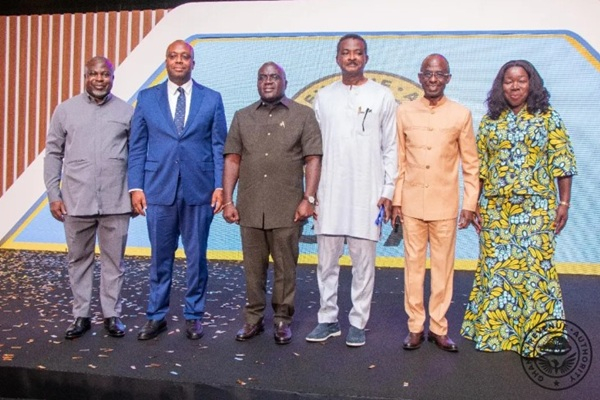The Ghana Revenue Authority (GRA), has introduced the Modified Taxation Scheme (MTS) to enable businesses in the informal sector to register and pay the right taxes on time and efficiently.
Under the MTS initiative, tax compliance processes have been simplified creating opportunity for more businesses to conveniently register and comply with tax laws.
The Authority also inaugurated the Sustained Tax Education programme, meant for tax awareness creation and deepening compliance, across the country.
Commissioner General of the GRA, Anthony Kwasi Sarpong, at the launch of the MTS and the Sustained Tax Education in Accra yesterday, explained that the MTS is a simplified approach for the informal sector, stressing that it is designed to make tax compliance easier, fairer, and more convenient for micro, small, and medium businesses.
The Modified Taxation scheme according to the Commissioner General, reflects GRA’s commitment to modernising the country’s tax administration in line with current practices.
This scheme, he explained, introduces simplified technology-driven processes that make compliance more convenient, predictable, and transparent, especially for small and medium enterprises, including individuals who form the backbone of the economy.
By reducing bureaucracy, streamlining registration, payments, and reducing discretion, the scheme minimises the opportunity for non-compliance and fosters trust between taxpayers and the GRA.
GRA to integrate 8 million informal sector workers into the tax net
Sarpong disclosed that the scheme, in simple terms, allows individuals and enterprises whose income does not exceed GHc500,000, to pay a flat rate of 30 percent.
”This means if an individual or a small business has an income of GHc200,000 annually, the annual tax on the income is GHc6000. Also, if an individual earn GHc25,000 yearly, the tax on the income becomes GHc750 through through the MTS scheme” the Commissioner General said.
The precedent, he indicated, will bring simplification and convenience to shops and small enterprises to enhance revenue mobilisation for national development.
The Sustained Tax Education Programme, according to the Authority, will equip citizens with practical knowledge on how to register, file, and pay taxes correctly and on time.
The GRA has developed a three-year plan to guide the implementation of this programme across the nation.
The programme aims to deepen citizens’ understanding of the tax system and their role in nation-building.
This initiative moves beyond periodic campaigns as it seeks to prepare tax education into national consciousness, targeting micro, small, medium, and large companies, schools, universities, markets, professional associations, and digital platforms.
When citizens are well-informed, compliance becomes a natural choice rather than an obligation enforced by law. The citizens and residents must be clear, know, and experience the value of paying taxes through voluntary compliance.
Deputy Minister of Finance, Thomas Nyarko Ampem, said the GRA and the Ministry aim to boost tax compliance from the informal sector which constitute 80 percent of the economy.
“Compliance has been low in the past years, but the MTS initiative and a sustained tax education plan will change the story,” Ampem noted.
Together with the Ministry of Finance, he said the GRA aims to improve domestic revenue compliance and achieve sustainable non-oil tax revenue consistent with Ghana’s medium-term fiscal targets.
He however noted that, this is not the responsibility of the government alone but a national duty, one that requires partnership among the public sector, private businesses, traditional authorities, faith-based organisations, and every citizen.
Launching the two initiatives, Chief of Staff, Julius Debrah, who was guest of honour at the ceremony, and represented President John Mahama, commended the GRA for embarking on the ever odious task of revenue mobilisation for national development and being innovative about tax collection.
Complex Tax Processes, Low Morale: GRA moves to fill gaps in Ghana’s tax system
Whilst adding that there is more room for improvement, he reminded officials that the GRA this year, had a target of GHc189 billion to collect.
He said as of September 2025, the Authority had collected GHc180.6 billion.
With the launch of the MTS and the Sustained Tax Education drive, the Chief of Staff was optimistic that the target would be met.
With government making good progress by removing some nuisance taxes inherited from the erstwhile administration, Debrah said it is also the responsibility of citizens to honour tax obligations to enhance national development and growth.
”Citizens commute on roads you would have paid for with taxes. We build safer and peaceful country by equipping our security personnel with taxes. It is the only tool to ensuring national development,” he indicated.
The MTS platform
The MTS is not a new tax, but a form of personal income tax for informal sector players. This policy targets incomes from small businesses who earn incomes only from sources within the country and are not registered for VAT.
The MTS which is downloadable on mobile devices require citizens to register with Ghanacard, digital address, phone number and business registration as well as sales information.
Tax payment on this platform is through a short code of *880# or the app, using mobile money wallet.
All you need to know about Ghana’s new vehicle number plates |BizTech:
